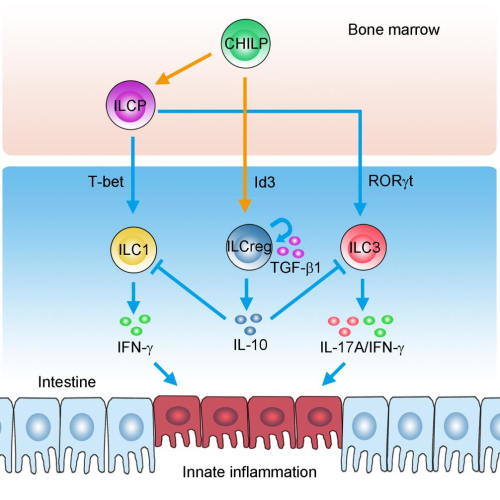ILCregs Play an Important Role in Regulation of Intestinal Inflammation
The intestine represents a major gateway for potential pathogens that contain dietary antigens as well as an extensive and diverse microbial flora that needs to be tolerated. Dysregulation of mucosal responses may cause a loss of tolerance, leading to harmful intestinal inflammation reminiscent of human inflammatory bowel disease (IBD). Innate lymphoid cells (ILCs) are located in mucosal surfaces to potentiate immune responses, sustain mucosal integrity and promote lymphoid organogenesis. Three subsets of ILCs have been defined to date and produce substantial effector cytokines upon harmful stress. These ILCs play critical roles in the regulation of type 1, type 2, and type 3 (or Th17 cell) responses, controlling host protective immunity and intestinal homeostasis.
Researchers from FAN Zusen’s group at the Institute of Biophysics (IBP) of the Chinese Academy of Sciences have identified a regulatory subpopulation of ILCs (called ILCregs) that exist in the gut and harbor a unique genetic identity distinct from ILCs or regulatory T cells (Tregs). During inflammatory stimulation, ILCregs can be induced in the intestine and suppress the activation of ILC1s and ILC3s via secretion of IL-10, leading to protection against innate intestinal inflammation.
In addition, TGF-?1 is consequently secreted by ILCregs upon intestinal inflammation, and autocrine TGF-?1 sustains the maintenance and expansion of ILCregs. Therefore, ILCregs exert an inhibitory role in the innate immune response, favoring the resolution of intestinal inflammation.
In this study, FAN Zusen’s group has defined a new group of regulatory ILC cells. ILCregs exert inhibitory functions in the regulation of innate intestinal inflammation. Thus, ILCregs may be used to develop potential therapies to restore immune tolerance in chronic inflammatory and autoimmune diseases.
This research, entitled "Regulatory Innate Lymphoid Cells Control Innate Intestinal Inflammation," which was published in Cell on August 24, involved cooperation with the Institute of Biophysics (IBP), the Institute of Genetics and Developmental Biology, Sichuan University and Jinan University. Profs. FAN Zusen and WANG Shuo (IBP) are the corresponding authors. Drs. WANG Shuo and XIA Pengyan (IBP) are the co-first authors of this paper.
This work was supported by the National Natural Science Foundation of China, the Strategic Priority Research Programs of the Chinese Academy of Sciences, the Youth Innovation Promotion Association of CAS, and the China Postdoctoral Science Foundation.

Fig.1 ILCregs contribute to the resolution of innate intestinal inflammation by inhibition of ILC1s and ILC3s.(Image by IBP)
Contact:
FAN Zuseng
Institute of Biophysics, Chinese Academy of Sciences
Email:fanz@moon.ibp.ac.cn
Tel:86-10-64888457

